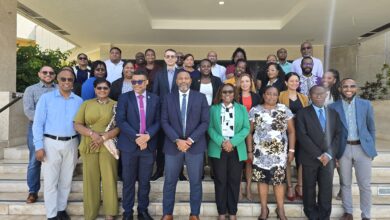The Most Honourable P.J. Patterson, Prime Minister of Jamaica,
Honourable Ministers of Government,
Members of the Diplomatic Corps,
Dr. Richard Bernal, Director-General of the Regional Negotiating Machinery,
Professor Norman Girvan, former Secretary-General of the ACS,
Members of the UWI Administration Mona
President of the Guild of Students,
Distinguished Educators,
Librarians,
Students,
Members of the media,
Distinguished ladies and gentlemen all
Good Evening. Few of you will know the tremendous relief this function provides for me and the entire staff of the CARICOM Secretariat. Relief that we have come this far at last in a project that has consumed much of our time and energies over the past few years. In fact, I wouldn’t be surprised if at the end of this function, we should hear the collective sigh of relief emanating from Georgetown, Guyana right across the hallowed plains of Mona.
But, I am happy to be in Jamaica for this launch; and I must say I got here just in time and despite the vagaries of intra-regional air transport services that provided me with some anxious moments of the past few days, and indeed, the entire week, as I fulfilled Community engagements in Guyana, St. Kitts and Saint Lucia.
It is significant in more than the symbolic, that this launch is taking place at Mona, the cradle of Caribbean intellectual thought and a well-spring of human resource development in our Caribbean Community.
I want to thank you all for being here this evening and especially the Most Honourable Prime Minister P.J. Patterson for doing us the additional honour of officially launching this publication. This is no accident however, for as you go through the book, you will see many photos of Prime Minister Patterson capturing over three decades of dedicated service to CARICOM. What you may not as readily appreciate, is the profound influence he has had on the development and achievements of CARICOM. For this, I take this opportunity to publicly express our thanks to him. Without his contribution – and the only thing that is negative about it – we would have had a much smaller book.
While we had also hoped to have had the current Chairman of CARICOM, Prime Minister Mitchell of Grenada, with us this evening, unfortunately, hurricane Ivan and even more recently the crisis in that other important pillar of Caribbean integration – cricket – have conspired to prevent him from being with us. I think he is in Barbados seeking to broker an agreement between the players and the Board.
Similarly, one of the more recent entrants to the sometimes hazardous field of political leadership, rime Minister Roosevelt Skerrit of Dominica, should also have been with us this evening. Unfortunately, an earthquake, which rocked Dominica on Sunday morning, and which unequivocally reminds us of the vulnerability of our Region, has kept him at home.
Ladies and Gentlemen, there is no shortage of literature on Caribbean regional integration and on CARICOM as an integration movement. What may be scarce, however, is literature that captures the historical, socio-economic and political context and explores the mechanics of regional integration, from the perspectives of those actively involved on a day-to-day basis. At the same time, many of the very valuable books written about CARICOM are usually tailored to fill the academic needs of tertiary level education and intellectual discourse carried on at the level of postgraduates and technocrats: And many among you have written and worked in this way.
Indeed, it is in this context that CARICOM Heads of Government have reaffirmed the need to establish arrangements to “promote a Caribbean ethos and give a sense of common purpose” in light of the wide gap that has been found to exist between official and popular knowledge of CARICOM. As a result, it was widely agreed that more varied CARICOM produced and disseminated educational, cultural and general community information programmes, were urgently needed. This, as a means of increasing public knowledge and appreciation of CARICOM among a more generalised readership that involves the average Caribbean citizen and most importantly, our young people.
The Book, CARICOM: Our Caribbean Community – a Introduction, is therefore, a timely initiative providing greater and more widespread knowledge of the history, present and future prospects of the Community, thereby, we hope, promoting wider participation in the process of community building and integration.
The book sketches our history as a people, outlines the process of modern Caribbean integration, explains in detail the structure and functioning of the Community, and provides us with some perspectives as we face the future, all in language that we hope, is easily understood. Always brought to the front, in the material (at least so we sought to achieve) is the impact – experienced and potential – which the many issues addressed will have on people of the Community. Equally important, has been the efforts to locate CARICOM and the Caribbean within the context of the overarching economic and geo-political architecture of the hemisphere and the global community.
In doing so, the Book draws heavily on illustrations – maps, charts, graphs and tables; and the use of colour to highlight the many issues and initiatives which have occupied the attention of the regional integration movement.
It also captures the mood, thoughts and actions of the Community and its leaders. This is nowhere more evident than towards the end of the decade of the 1980s – a critical turning point in our evolution and development. This was the point at which bold responses were fashioned as the gathering storm of globalization threatened us with marginalization and even annihilation.
Along with the CARICOM Single Market and Economy (CSME) and the launching of the important process to revise the Treaty Establishing the Community, that period was also important for a concerted move to democratise the regional integration process. The Community, as you will recall, then resorted to the establishment of the West Indian Commission. The important results coming from the Commission led to the development of a Charter of Civil Society as well as the creation of a deliberative body – the Assembly of Caribbean Community Parliamentarians.
Apart from discussing the challenges and presenting the successes and failures of the Community, the book ventures to provide pointers and suggestions on the possible way forward in a range of areas that are all vital to our continued survival and success so as to fulfill the legitimate expectations of our people for greater security and prosperity.
In this regard, it recognises the significant value of the volumes of Hall and Benn on the future development of the Caribbean Community.
Although “Our Caribbean Community” targets persons in the 14-24 age group, we believe that its clear style of presentation will be attractive and useful to a wide cross section of readers.
One subject covered in the book that is of particular importance and topical relevance, is the creation of the CARICOM Single Market and Economy including the Caribbean Court of Justice. These will have profound implications for everyday life in the Community: All the more reason that CARICOM citizens, from the youth to the elderly, must be kept informed.
We at the CARICOM Secretariat are therefore proud to present this ‘reader’ – CARICOM: Our Caribbean Community – A Introduction – not as a bible, but as a useful guide as we advance the process of regional integration. It represents a labour of love and commitment to the Region and to its people and we hope it will be accepted as such.
Ladies and Gentlemen, I am pleased not only to participate in this historic book launch, but also to have been afforded the opportunity to do so on my own campus and alma mater.
Tonight in this process, we bring together representatives of the Region’s:
- political directorate;
- technocratic arm;
- academia; and
- wider civil society, including the media.
It is my hope that with the help of this publication we will succeed in building a sturdy Caribbean Community – one, in the words of the Prime Minister of Barbados “that is a lived experience”, worthy of the highest aspiration of all our people.





